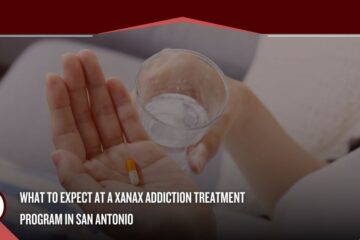Overcoming addiction is a complex and challenging process that often requires more than individual willpower to overcome. In the realm of addiction treatment, the power of community and shared experiences is immense. Group therapy, a therapeutic approach where individuals with similar struggles come together at detox facilities in San Antonio Texas to support and heal collectively, has proven to be an invaluable resource in addiction recovery. Alamo Behavioral Health will explore the world of group therapy during addiction treatment in San Antonio. We will discuss its purpose, modalities, and the individuals it is most beneficial for.
The Purpose of Group Therapy During Addiction Treatment in San Antonio
Group therapy during addiction treatment in San Antonio is a therapeutic approach that involves a trained therapist facilitating a session with a small group of individuals who are struggling with substance abuse issues. During these sessions, participants engage in open and honest discussions about their experiences, challenges, and progress in overcoming addiction.

In 2017, Texas counted more than 1.6 million veterans of the armed forces among its residents, establishing it as the second-largest state in terms of its veteran population. Veterans are especially susceptible to drug addiction due to the unique challenges they face, including the effects of combat, deployment-related stressors, and the transition to civilian life. To address these specific needs, many addiction treatment centers in San Antonio offer specialized programs tailored to veterans, recognizing the importance of providing support and tailored care to those who have served our nation. These programs incorporate evidence-based therapies, including group therapy for addiction, to help veterans on their journey to recovery and healing.
The primary purpose of group therapy in addiction treatment is to provide individuals with a supportive and structured environment. This therapeutic setting is essential for people undergoing PTSD treatment for veterans in Texas as it gives them an opportunity to share their thoughts and feelings related to addiction.
How Group Therapy Works in Addiction Treatment
Group therapy is a widely used and effective approach in addiction treatment programs. Here’s a straightforward explanation of how group therapy during addiction treatment in San Antonio functions:
- Formation of groups – In addiction treatment centers, participants are organized into small groups, typically consisting of 5 to 15 individuals. These groups are often diverse, with members at various stages of recovery and different substance abuse backgrounds.
- Trained facilitator – Each group is led by a trained therapist or counselor who serves as the facilitator. The facilitator’s role is to guide the discussion, ensure a safe and respectful environment, and provide therapeutic interventions when needed.
- Scheduled sessions – Group therapy sessions are conducted regularly, usually once or twice a week, depending on the treatment program. The consistency of these sessions is essential for participants’ progress.
- Structured discussions – During sessions, participants engage in structured discussions on topics related to addiction and recovery. These topics may include coping strategies, triggers, relapse prevention, and personal progress.
- Open sharing – Participants are encouraged to share their thoughts, feelings, and experiences honestly. This open and honest communication is a fundamental aspect of group therapy, as it fosters connection and support among members.
- Support and feedback – Group members provide support to one another by offering feedback, empathy, and encouragement. They may share their own experiences and insights to help others navigate similar challenges.
- Progress tracking – Over time, group members can track their progress and witness the growth of their peers. Celebrating achievements and milestones is an important part of medical detox in San Antonio of group therapy.
- Gradual transition – As individuals progress in their recovery, they may transition to different groups or treatment modalities, such as individual therapy or aftercare programs, depending on their needs.

Advantages of Group Therapy in Addiction Treatment
Group therapy during addiction treatment in San Antonio offers benefits that contribute to a more comprehensive and effective approach to overcoming substance abuse issues:
- Peer support and connection – Group therapy provides a unique opportunity for people in veterans drug rehab in Texas to connect with others who are facing similar challenges. Being part of a group offers a sense of belonging and a support network that can be crucial for recovery.
- Shared learning and insights – Participants in group therapy have the chance to learn from each other’s experiences and gain insights into their own struggles with addiction. Hearing different perspectives and strategies can be invaluable in finding effective solutions.
- Reduced isolation – Addiction often leads to isolation and a sense of being alone in one’s struggles. Group therapy combats this isolation by creating a space where individuals can openly discuss their feelings and experiences. This helps reduce feelings of loneliness and shame.
- Diverse perspectives – Group therapy brings together people from various backgrounds and walks of life. This diversity fosters a rich exchange of ideas and experiences, allowing participants to see addiction and recovery from different angles.
- Emotional support – Within the group setting, participants can express their emotions without fear of judgment. This emotional release can be therapeutic and contribute to emotional healing.
- Skill development – Group therapy often includes practical exercises and skill-building activities that equip individuals with tools to cope with cravings, triggers, and stressful situations.
- Validation – Sharing personal experiences in the group can lead to validation and understanding. Participants realize they are not alone in their struggles, reducing feelings of self-doubt and guilt.

Comparing Group and Individual Therapy in Addiction Treatment
Understanding group therapy during addiction treatment in San Antonio requires a comparison to individual therapy for addiction. Here are the key differences:
- Social support:
- Group therapy: Provides peer support and a sense of community, allowing participants to share experiences.
- Individual therapy: Offers one-on-one attention but lacks the social element.
- Personalization:
- Group therapy: Follows a structured format addressing common issues.
- Individual therapy: Highly personalized, tailored to the individual’s specific needs.
- Privacy:
- Group therapy: Confidential but involves sharing with others.
- Individual therapy: Provides a higher level of privacy with confidential discussions.
- Learning and insights:
- Group therapy: Enables learning from peers’ experiences and diverse perspectives.
- Individual therapy: Relies on the therapist’s guidance and expertise.
- Accountability:
- Group therapy: Enhances accountability through group commitment.
- Individual therapy: Accountability depends on the client’s commitment.
Comparing Group Therapy and Family Therapy in Addiction Treatment
To understand group therapy during addiction treatment in San Antonio, we also need to compare it to family therapy for addiction. Here are some key aspects:
- Participants:
- Group therapy: Involves individuals with addiction issues who meet in a group setting.
- Family therapy: Involves family members or loved ones of the person with addiction, focusing on the family dynamic.
- Focus and goals:
- Group therapy: Focuses on individuals’ recovery, addressing personal challenges and coping strategies.
- Family therapy: Concentrates on family dynamics, communication, and how they affect addiction and recovery.
- Support network:
- Group therapy: Provides peer support within the group, fostering a sense of belonging.
- Family therapy: Strengthens the support network within the family, promoting understanding and healthier relationships.
- Confidentiality:
- Group therapy: Maintains confidentiality within the group, though some information may be shared.
- Family therapy: Requires open communication among family members, potentially challenging confidentiality.
- Learning and insights:
- Group therapy: Encourages learning from peers’ experiences and diverse perspectives.
- Family therapy: Promotes understanding of family roles and how they relate to addiction, leading to insights and improved family dynamics.
- Accountability:
- Group therapy: Enhances accountability through group commitment.
- Family therapy: Promotes collective responsibility and support within the family.
- Scope of impact:
- Group therapy: Primarily focuses on the individual’s addiction and recovery journey.
- Family therapy: Addresses the broader family system, impacting relationships and support networks.
- Timing and frequency:
- Group therapy: Scheduled sessions for individuals, usually weekly or biweekly.
- Family therapy: Timing varies but often involves fewer sessions focused on specific family issues.
Therapeutic Modalities Used in Group Therapy
Group therapy sessions in addiction treatment often employ various therapeutic modalities to address the unique challenges individuals face in their recovery journey. Here are some key modalities of group therapy during addiction treatment in San Antonio:
- Cognitive behavioral therapy (CBT)
- Dialectical behavior therapy (DBT)
- Psychoeducation
- Mindfulness-based approaches
- Motivational interviewing
- Narrative therapy

Cognitive Behavioral Therapy (CBT)
CBT for addiction focuses on identifying and changing negative thought patterns and behaviors. In group therapy, participants work together to identify shared cognitive distortions related to addiction. They collaboratively challenge these distortions, providing each other with constructive feedback and alternative perspectives. Group members can also hold each other accountable for implementing CBT-based coping strategies discussed during sessions.
Dialectical Behavior Therapy (DBT)
DBT emphasizes emotional regulation, distress tolerance, and interpersonal effectiveness. In a group setting, individuals can practice DBT skills through role-playing and peer support. Group members learn to validate each other’s emotions and provide real-time feedback on the effectiveness of DBT techniques. The group dynamic encourages skill-building and fosters an environment of empathy and acceptance.
Psychoeducation
Psychoeducation in group therapy involves providing participants with information about addiction, its effects, and strategies for recovery. In this setting, which is used in dual diagnosis treatment centers in San Antonio TX, psychoeducation sessions can take the form of group discussions, workshops, or presentations. Group members can share their personal insights and experiences related to the information presented, creating a collaborative learning environment. This shared understanding helps normalize addiction struggles and fosters a sense of unity among participants.
Mindfulness-Based Approaches
Mindfulness practices, such as meditation and breathing exercises, can be introduced in group therapy to help participants who struggle with alcohol addiction manage cravings, reduce stress, and enhance self-awareness. Group members can engage in guided mindfulness exercises together during drug and alcohol rehab in San Antonio and create a collective sense of calm and emotional regulation. Additionally, participants can share their mindfulness experiences and offer mutual support in implementing these techniques outside of therapy.
Motivational Interviewing (MI)
Motivational interviewing aims to explore and strengthen an individual’s motivation for change. In group therapy, members can engage in role-playing exercises to practice MI for substance abuse. They take on the roles of both the therapist and the client, providing an opportunity to learn effective communication skills and motivational strategies from one another. MI-based discussions within the group can help individuals clarify their goals and increase their commitment to recovery.
Narrative Therapy
Narrative therapy encourages individuals to reframe their addiction stories in a more positive and empowering light. In a group setting, participants can share and reshape their narratives collectively. Group members listen actively, offer alternative perspectives, and help each other discover new, more constructive narratives that promote healing and personal growth.
Is Group Therapy for You?
Here are some aspects to consider in order to decide whether group therapy for addiction treatment in San Antonio is right for you:
- Group therapy is ideal for those who benefit from connecting with peers facing similar challenges. It provides a support network and a sense of camaraderie that can be especially motivating in addiction recovery.
- Individuals comfortable with discussing their experiences, thoughts, and emotions in front of a small group are likely to find group therapy beneficial. This openness fosters a sense of trust and shared healing.
- If you need external accountability to stay on track with your recovery goals, group therapy can provide this structure. Group members can encourage and hold each other accountable for attending sessions and making progress.
- Addiction often leads to social isolation and strained relationships. Group therapy helps individuals rebuild healthy social interactions, improve communication, and develop better interpersonal relationships.
- Group therapy allows participants to learn from one another’s experiences and coping strategies. It’s well-suited for individuals who value collaborative learning and gaining insights from their peers.
- Group therapy during addiction treatment in San Antonio is often more cost-effective than individual therapy, making it a practical option for those looking for affordable addiction treatment.

Insurance Coverage Concerns
It is natural to have concerns about whether group therapy for addiction treatment is covered by insurance. The good news is that insurance usually covers group therapy as part of a comprehensive treatment plan. However, it’s essential to check your specific policy details to understand the extent of coverage and any potential out-of-pocket expenses. Alamo Behavioral Health has dedicated staff who can assist you in verifying insurance benefits and guiding you through the financial aspects, ensuring that you can access the support you need without added stress. Some of the insurance policies for group therapy during addiction treatment in San Antonio we accept include:
- Cigna rehab coverage
- Tricare rehab coverage
- UMR rehab coverage
- Humana rehab coverage
- BCBS rehab coverage
Join the Group Therapy and Take Your First Step Toward Recovery
Group therapy during addiction treatment in San Antonio fosters peer support, shared learning, and connection among individuals seeking recovery. It provides a forum where personal struggles are met with empathy and victories are celebrated together. We invite those on their path to recovery to consider the advantages it offers: the strength found in unity, the wisdom gained from diverse perspectives, and the healing power of communal support. Remember that the path to recovery is as unique as the individual walking it, and group therapy stands ready to help you reach long-lasting sobriety.





